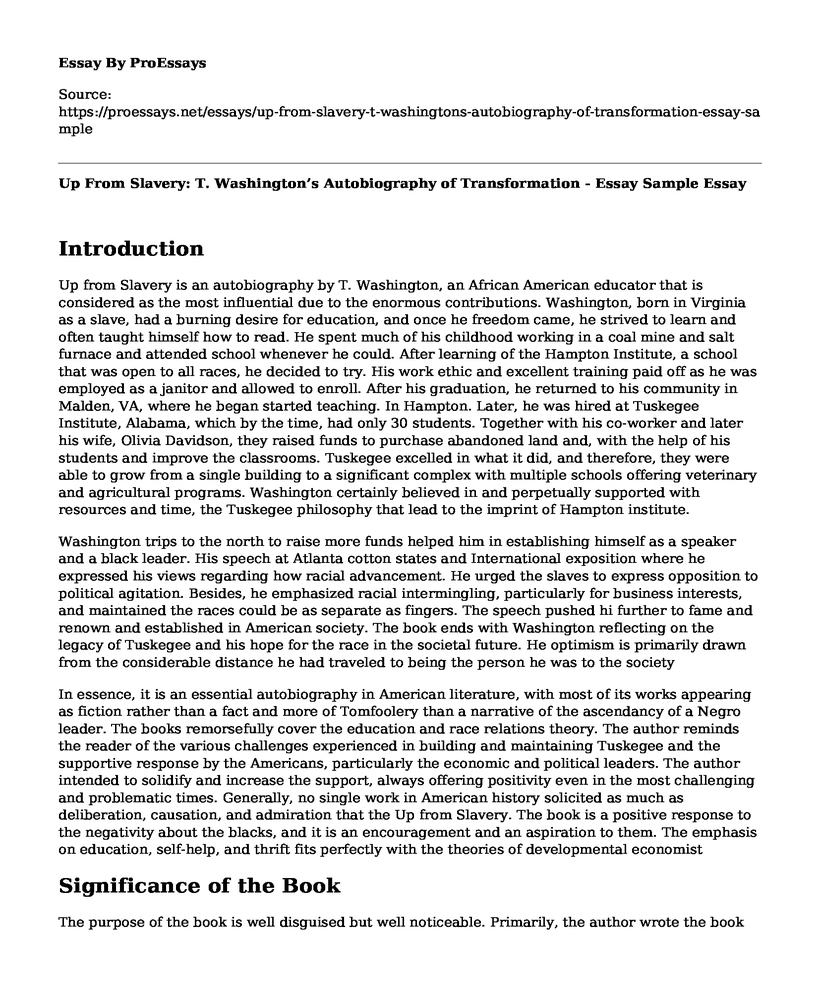Introduction
Up from Slavery is an autobiography by T. Washington, an African American educator that is considered as the most influential due to the enormous contributions. Washington, born in Virginia as a slave, had a burning desire for education, and once he freedom came, he strived to learn and often taught himself how to read. He spent much of his childhood working in a coal mine and salt furnace and attended school whenever he could. After learning of the Hampton Institute, a school that was open to all races, he decided to try. His work ethic and excellent training paid off as he was employed as a janitor and allowed to enroll. After his graduation, he returned to his community in Malden, VA, where he began started teaching. In Hampton. Later, he was hired at Tuskegee Institute, Alabama, which by the time, had only 30 students. Together with his co-worker and later his wife, Olivia Davidson, they raised funds to purchase abandoned land and, with the help of his students and improve the classrooms. Tuskegee excelled in what it did, and therefore, they were able to grow from a single building to a significant complex with multiple schools offering veterinary and agricultural programs. Washington certainly believed in and perpetually supported with resources and time, the Tuskegee philosophy that lead to the imprint of Hampton institute.
Washington trips to the north to raise more funds helped him in establishing himself as a speaker and a black leader. His speech at Atlanta cotton states and International exposition where he expressed his views regarding how racial advancement. He urged the slaves to express opposition to political agitation. Besides, he emphasized racial intermingling, particularly for business interests, and maintained the races could be as separate as fingers. The speech pushed hi further to fame and renown and established in American society. The book ends with Washington reflecting on the legacy of Tuskegee and his hope for the race in the societal future. He optimism is primarily drawn from the considerable distance he had traveled to being the person he was to the society
In essence, it is an essential autobiography in American literature, with most of its works appearing as fiction rather than a fact and more of Tomfoolery than a narrative of the ascendancy of a Negro leader. The books remorsefully cover the education and race relations theory. The author reminds the reader of the various challenges experienced in building and maintaining Tuskegee and the supportive response by the Americans, particularly the economic and political leaders. The author intended to solidify and increase the support, always offering positivity even in the most challenging and problematic times. Generally, no single work in American history solicited as much as deliberation, causation, and admiration that the Up from Slavery. The book is a positive response to the negativity about the blacks, and it is an encouragement and an aspiration to them. The emphasis on education, self-help, and thrift fits perfectly with the theories of developmental economist
Significance of the Book
The purpose of the book is well disguised but well noticeable. Primarily, the author wrote the book to share about his life to power education and help in improving lives. Washington presents school as paradise and an avenue to escape ignorance by becoming equipped to help the community. Further, the author advocates for self-reliance by maintaining individual merit can help in bringing success. At Tuskegee, he not only insisted learners practice a trade, but he also went further to advising them they should learn to construct, grow food, and build furniture. Finally, the book's leading theme advocacy is based on fellowship between races. The author believed that the only way to end racial differences was through the association between the races. As such, he shows no animosity towards his former enslavers.
The book fairly succeeds because the writer was narrating a personal experience based on what was happening in America. He addressed various issues at the time, such as race. However, if the book were written by a non-American, the success would not have been huge because the experience would have been different. It would have been practically impossible for someone to push and advocate for the race while he does not know the extent of racial problems and what possibly could help end the issue in America.
Bibliography
American South. "Summary of Up from Slavery: An Autobiography." Documenting the American South Homepage. Accessed April 20, 2020. https://docsouth.unc.edu/fpn/washington/summary.html.
GradeSaver. "Up From Slavery Summary." Study Guides & Essay Editing | GradeSaver. Last modified, March 11, 2020. https://www.gradesaver.com/up-from-slavery/study-guide/summary.
"SparkNotes: Up From Slavery: Plot Overview." SparkNotes: Today's Most Popular Study Guides. Accessed April 20, 2020. https://www.sparknotes.com/lit/up-from-slavery/summary/.
Cite this page
Up From Slavery: T. Washington's Autobiography of Transformation - Essay Sample. (2023, May 23). Retrieved from https://proessays.net/essays/up-from-slavery-t-washingtons-autobiography-of-transformation-essay-sample
If you are the original author of this essay and no longer wish to have it published on the ProEssays website, please click below to request its removal:
- The Legacy of Slavery in America - Essay Sample
- Race During the Industrial Revolution Essay
- Compare and Contrast Earnest Becker and Erich Fromm and Their Contribution to Karl and Sigmund Freud
- The African Americans Many River to Cross Episode 2 Essay Example
- Essay Example on Reconstruction: Black Codes & the Re-Shaping of the South
- Essay Sample on The Ballad of Birmingham: Revealing Injustices of 1969 Church Bombings
- Moral Issues of War Police and Terrorism in America - Free Paper Example







